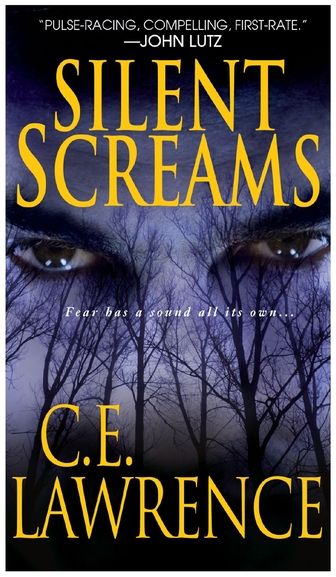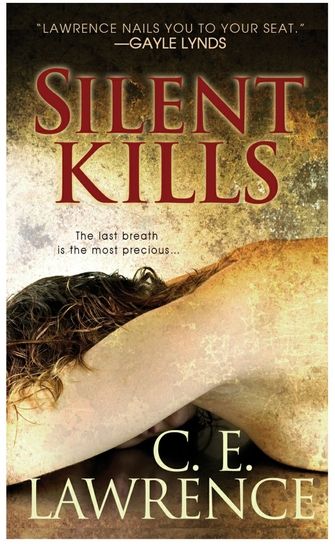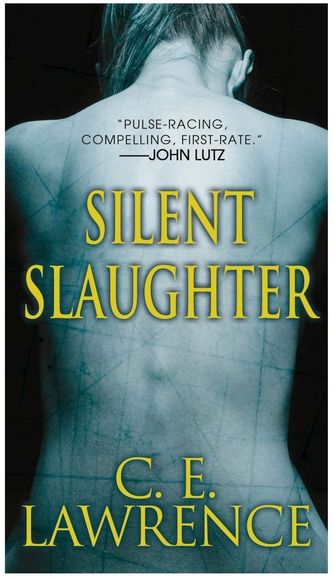Silent Stalker (8 page)
Authors: C. E. Lawrence

C
HAPTER
T
HREE
HAPTER
T
HREE
Edmund gazed lovingly at the girl on the bed. She had stopped struggling now and gazed up at him with terror in her eyes. Small-animal sounds came from her throat, like the whimpering of a rabbit. The black duct tape over her mouth made it impossible for her to make any serious noise. He took in the sight of her, reveling in every detail: the fair skin with its faint dusting of freckles, the nails with their chipped polish, in need of a manicure.
Too bad,
he thought. She had had her last manicure. Lust surged through his body at the thought of the complete power he had over her.
he thought. She had had her last manicure. Lust surged through his body at the thought of the complete power he had over her.
Most of all he liked to watch their eyes. The moment when their fear turned to pure animal terror was deliciousâit never failed to send a shiver of pleasure down his spine. There was an instant when they all realized they were going to die, and watching the hope drain from their faces was thrilling, an intoxicating nectar. And the more he drank, the more he craved.
He had it all planned outâthe who, what, where, and when, right down to the last detail. The key to success was organization.
He glanced at the wall clock. It was exactly six, the big and little hands forming a perfect 180-degree angle, a straight line . . . the shortest distance between two points. The sight of it sent warm little shivers down his spine.
Six o'clock, and all's well.
Time to get to work.
Six o'clock, and all's well.
Time to get to work.
C
HAPTER
F
OUR
HAPTER
F
OUR
Lee left Butts with instructions to inform him of any updates and headed back to his apartment through the descending December dusk. He decided to walk the mile or so home, turning south on Second Avenue. The storefronts sported festive holiday decorations, the nodding Santas and grinning elves in stark contrast to the grim thoughts running through his head. As he walked, he pondered the nature of the letter writer and didn't like his conclusions.
Intelligent, mature, arganized. And cruel.
The man's coldness practically leaped off the page.
Intelligent, mature, arganized. And cruel.
The man's coldness practically leaped off the page.
Of course, there was no telling what his crimes were or would be, but this was no ordinary jealous husband or bitter ex-employee about to go on a rampage. This man would be more difficult to catch than the average criminal because, more likely than not, he would not know any of his victims. He was in complete control, and he was enjoying himself.
In short, Lee concluded, he was very likely a sociopath.
Similar thoughts crowded his mind as he passed the cozy, misted windows of the Stage Restaurant, a tiny Polish hole-in-the-wall serving fabulous homemade soups, pierogis, and the best turkey burger in the East Village. Next door to the Orpheum Theater, it served a constant stream of actors and audience members, both locals and tourists. The customers perched on the stools lining the counter were not thinking of roaming sociopaths as they hunched over bowls of steaming cabbage soup.
That was his job. As the only full-time NYPD profiler, Lee was technically a “civilian adviser”âbut he was called in on the hardest cases, the ones resistant to forensics and ordinary detective work.
He turned west at the corner of Second Avenue and Seventh Street, where for many years the Kiev was a popular place for late-night revelers as well as the neighborhood's elderly Eastern European residents. The Kiev was gone now, replaced by a trendy Korean restaurant, the kind of place where sleek young Asian waiters looked as bored as the well-heeled clientele.
The venerable Veselka still remained, though it had lost some of its downtown charm in a renovation a few years ago. He preferred it in the old days, when he would squeeze past the hodgepodge of tables scattered at odd angles in the crowded front room to get to his favorite table in the tiny back room, underneath a narrow winding staircase leading up to a tiny, cluttered office.
Dusty ferns and spindly spider plants festered in moldy pots on the windowsill, as they had for decades, watching over endless cups of coffee served to aspiring actors and anarchists, scholars and scoundrels. That was the Veselka he lovedâdirty and rumpled as an old coat. The new one, with its forest green trim and tidy paint job, was indistinguishable from Starbucks. New York was constantly reinventing itself, and it could break your heart. But he was hungry, so he stopped in for a bowl of soup.
By the time he reached his building, it was nearly seven. As soon as he'd turned the lock in his apartment, the phone rang. He saw on the caller ID that it was his mother. She hated cell phones and only called him on the landline. He suspected one reason for this was a decline in her hearing, but she would never admit that. Fiona Campbell was a classic example of Scottish stoicism. Never complain, never grovel, and never admit to weakness of any kind. She was a virtuoso of denial, gifted in the art of deflectionâso successful, in fact, that she had delegated most of her darker emotions to her children. And now that Lee's sister was gone, the role of “surrogate empath” fell to him.
He picked up on the third ring.
“Hi, Mom.”
“Hello, dear.” She sounded annoyed. He knew Fiona didn't like caller ID, and he enjoyed irking her.
“Good timingâI just walked in the door. Are you calling about this weekend?”
“I just wanted to know if you were still planning on coming.”
Lee rarely cancelled plans on his mother, yet she always called to double-check. Her determination to avoid disappointment no doubt stemmed from his father's abrupt departure years before. Lee suspected she had never fully recovered from the shock, instead devoting her life to keeping other people at bay. Vulnerability did not come naturally to Fiona Campbell, and after his father left, she had constructed her firewalls carefully.
“I'm still coming, Mom,” he said.
“Good. Kylie is counting on you.”
“Kylie is counting on you. ” Good one, Momâprojecting your needs on to your grandchild. For God's sake, don't admit you want to see me.
Kylie was his sister's only child. Since Laura's mysterious disappearance six years ago, Fiona had shared the care of her granddaughter with Kylie's father, who also lived in New Jersey's Delaware Valley. Lee saw his niece as often as possible, and he was planning to drive out for her school Christmas concert over the weekend.
His cell phone buzzed in his jacket pocket. He dug it outâit was Butts.
“Sorry, Mom, I gotta go,” he said. “I have another call. See you this weekend.”
“All right,” she said stiffly and hung up. He sighedâher ruffled feathers might need some smoothing when he saw her.
He picked up the cell phone. “I'm here,” he said. “What's up?”
“They found the girl,” Butts said. “Lisa Adler.”
“Where?”
“In the back of Shinbone Alley, off Bond Street. It's him, Lee. It's the guy who wrote to me.”
“How do you know?”
“He left a note. I'm on my way to the scene now.”
Lee glanced at his watch. “I'll be there in fifteen minutes. Call Krieger, and tell her to meet us there.”
Elena Krieger, forensic linguistics specialist, was the most glamorous cop Lee had ever met. She was also the most difficult to work with. But her skill was needed nowâand even Butts, who couldn't stand her, must realize that.
The detective was silent.
“Call her,” Lee said. “We need her.”
“All right.” Butts didn't sound happy about it.
“See you there.”
“Right. ”
He hung up and threw on his coat, pausing to pull his curtains closed as night settled over the East Village. The sound of Christmas carols floated out from the Ukrainian church across the street: “I Heard the Bells on Christmas Day.” He recognized John Calkin's setting of Longfellow's words.
Then pealed the bells more loud and deep:
“God is not dead, nor doth He sleep;
The wrong shall fail, the right prevail
With peace on earth, good will to men. ”
“God is not dead, nor doth He sleep;
The wrong shall fail, the right prevail
With peace on earth, good will to men. ”
As he turned out the lights in his apartment and closed the door behind him, he could only hope that Longfellow was right.
ABOUT THE AUTHOR
C. E. Lawrence is the byline of a New York-based suspense writer whose previous books have been praised as “lively” (
PW
); “constantly absorbing” (starred
Kirkus Review
); and “superbly crafted prose” (
Boston Herald
). Born in Nurnberg, Germany, to American parents, she is a former member of the legendary improvisational company First Amendment. Lawrence has written award-winning plays and musicals that have been produced around the world and is a member of the Dramatists Guild as well as Mystery Writers of America, International Thriller Writers, and Sisters in Crime. Lawrence's published works include eight novels, six novellas, several plays and musicals, and numerous short stories and poems. Her short stories have appeared in anthologies including
Vengeance,
edited by Lee Child.
PW
); “constantly absorbing” (starred
Kirkus Review
); and “superbly crafted prose” (
Boston Herald
). Born in Nurnberg, Germany, to American parents, she is a former member of the legendary improvisational company First Amendment. Lawrence has written award-winning plays and musicals that have been produced around the world and is a member of the Dramatists Guild as well as Mystery Writers of America, International Thriller Writers, and Sisters in Crime. Lawrence's published works include eight novels, six novellas, several plays and musicals, and numerous short stories and poems. Her short stories have appeared in anthologies including
Vengeance,
edited by Lee Child.




PINNACLE BOOKS are published by
Â
Kensington Publishing Corp.
119 West 40th Street
New York, NY 10018
119 West 40th Street
New York, NY 10018
Â
Copyright © 2012 C. E. Lawrence
Â
All rights reserved. No part of this book may be reproduced in any form or by any means without the prior written consent of the publisher, excepting brief quotes used in reviews.
Â
If you purchased this book without a cover, you should be aware that this book is stolen property. It was reported as “unsold and destroyed” to the publisher, and neither the author nor the publisher has received any payment for this “stripped book.”
Â
This book is a work of fiction. Names, characters, businesses, organizations, places, events, and incidents either are the product of the author's imagination or are used fictitiously. Any resemblance to actual persons, living or dead, events, or locales is entirely coincidental.
Â
PINNACLE BOOKS and the Pinnacle logo are Reg. U.S. Pat. & TM Off.
ISBN: 978-0-7860-3241-9
Other books
La Papisa by Donna Woolfolk Cross
Hotter After Midnight by Cynthia Eden
Blood Lies by Daniel Kalla
The Dead Boy by Saunders, Craig
Kingdom Woman: Embracing Your Purpose, Power, and Possibilities by Evans, Tony, Hurst, Chrystal Evans
Midsummer's Eve by Philippa Carr
I Love My Side of the Story by Sabrina Lacey
Working for Bigfoot by Jim Butcher
Psychotrope by Lisa Smedman
Wolfe Wedding by Joan Hohl
